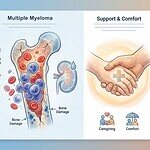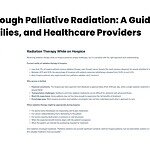Category: Hospice
Article pertaining to Hospice to help the patient, caregivers, facility staff members, and hospice care team members prepare the patient for a “good death.”
Article pertaining to Hospice to help the patient, caregivers, facility staff members, and hospice care team members prepare the patient for a “good death.”

Everyone 18 and older needs advance directives, but how do you choose between free forms, attorneys, or end-of-life doulas? We break down the costs, pros, and cons of each to help you ensure your medical wishes are honored.

Hospice fraud not only harms terminally ill patients but also devastates their caregivers and families. This article explores the impacts and offers tips on choosing a reliable hospice provider.

As a nurse or doctor, you have the power to transform patient care through timely end-of-life conversations. This guide provides practical strategies to help you confidently discuss prognosis, encourage advance care planning, and introduce hospice care when appropriate—across hospitals, nursing facilities, and more.

When trauma and grief collide after suicide, homicide, or sudden accidents, the pain can feel unbearable. This guide offers practical coping strategies, self-care techniques, and professional resources to help you navigate traumatic loss. Learn the difference between grief support options and discover pathways toward healing.

This comprehensive guide helps patients, families, and caregivers understand Multiple Myeloma diagnosis and staging, explore survival expectations, and navigate palliative and hospice care options. Discover practical caregiving strategies and when early palliative care can enhance quality of life.

When someone you love has dementia, seizures may become part of their journey. Learn which types of dementia increase seizure risk, how to recognize and respond to seizures safely, when to call for emergency help, and which medications may affect seizure risk. This compassionate guide empowers caregivers with knowledge and confidence.

Hospice providers have proven strategies to reduce symptom burden and boost satisfaction scores. Discover how combining nurse practitioner telehealth visits, educational videos, and end-of-life doula support transforms caregiver confidence and patient comfort in home-based care.

End-of-life doulas offer untapped potential as compassionate partners in healthcare. These trained professionals complement hospice care by providing extended emotional and spiritual support, serving as life transition coaches long before hospice is needed—enhancing end-of-life experiences for families.

Navigate the journey of acute myeloid leukemia with confidence. This comprehensive guide covers disease progression, comfort-focused symptom management, and practical palliative and hospice care timing advice.

A heartbreaking Facebook post reveals the devastating reality when families don't plan ahead for long-term care. Learn how Medicaid Asset Protection Trusts and working with life transition coaches years in advance can protect your home, savings, and dignity—and why the five-year lookback means you must act now.

After 15 years and 300 final breaths, nurse Laura M. discovered seven profound truths about what truly matters in life. Her patients didn't fear dying—they feared not having really lived. Learn these life-changing lessons and discover how life transition coaches can help you live with fewer regrets and ensure your wishes are honored.

End-of-life doulas provide non-medical support that transforms dying experiences through education, emotional companionship, and advocacy. Learn how these trained professionals help patients and families navigate terminal illness with dignity, how healthcare providers can partner with doulas, and what to look for when selecting one.

Anticipatory grief is a normal, natural response to an expected loss that shows the depth of your love. This guide explains what anticipatory grief is, why it happens, how grief coaches and licensed counselors can help, and practical steps for families and caregivers to express feelings and find support during this difficult time.

Quality end-of-life care reduces complicated grief among families. Research shows that families who feel supported and witness dignified care experience fewer prolonged grief reactions. Learn how life transition coaches and end-of-life doulas provide essential emotional, spiritual, and practical support that bridges gaps in healthcare, helping families navigate loss with greater peace and understanding.

Palliative radiation therapy offers targeted symptom relief for patients with advanced cancer, reducing pain, bleeding, and other distressing symptoms. This comprehensive guide empowers patients and families to understand treatment options, manage side effects, and make informed decisions that prioritize comfort and quality of life.

The fear of dying alone is growing as families live farther apart and more people age without close support networks. End-of-life doulas and life transition coaches offer a solution by providing continuous companionship, emotional support, and guidance throughout serious illness and the dying process.

Despite Medicare's six-month hospice benefit, most patients receive care for only 18-21 days, often when already transitioning to death. Research shows early hospice enrollment can extend life by 29-81 days while dramatically improving quality of life. Life transition coaches help families navigate earlier hospice and palliative care adoption for better outcomes.

A hospice nurse reflects on a powerful moment with a dying patient who painted "Three Wishes"—dandelions symbolizing childhood innocence and life's fleeting nature. This experience teaches us to examine how we're living, who we love, and what matters most. Learn why advance directives and living with fewer regrets matter for everyone.

Looking to determine appropriate pricing for end-of-life doula services? This detailed guide compares sliding-scale fees with full-price and donation-based options. Learn effective strategies for establishing fair rates, applying a sliding-scale system, and ensuring compassionate care remains affordable for all families.

Geri-Gadgets® are safe, sensory-rich fidget tools designed to help people with dementia, neurodiverse individuals, and anyone who benefits from fidgeting. These colorful, non-toxic products improve mood, reduce anxiety, encourage engagement, and support physical and cognitive health. Learn how these innovative tools can transform care.

Research shows private equity-owned hospice agencies spend less on direct patient care, leading to higher hospitalization rates and poorer quality. End-of-life doulas bridge these gaps by providing emotional, social, and spiritual support, vigil planning, and legacy projects that most hospice agencies don't offer.

A palliative care doctor shares people's three most common wishes at the end of life: mending relationships, expressing gratitude, and saying "I love you." Planning for a good death with the help of a life transition coach can help you accomplish more meaningful goals and ensure your final days reflect your values.

Chronic Obstructive Pulmonary Disease (COPD) is a serious lung condition linked to smoking and vaping that affects millions of people. Understanding the connection between tobacco use and COPD, recognizing early symptoms, and pursuing timely treatment can significantly extend life expectancy and improve quality of life.

Explore how aromatherapy and essential oils relieve anxiety, grief, loss, and critical symptoms like pain and nausea across all stages of life. Practical, safe use tips are provided for caregivers, doulas, and health professionals to support holistic well-being.